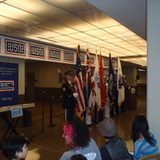New medal for modern warfare sparks strong reaction

|
A student pilot and sensor operator man the controls of a MQ-9 Reaper in a ground-based cockpit during a training mission flown from Hancock Field Air National Guard Base, Syracuse, New York, in this May 2012 photo.
|
|

View Photo Gallery »
KAISERSLAUTERN, Germany — The news that a medal has been created to honor the “extraordinary actions” of drone pilots and other servicemembers acting far from the battlefield has triggered strong reactions about medals and their value.
In one of his last official acts, outgoing Defense Secretary Leon Panetta on Wednesday announced the creation of the Distinguished Warfare Medal, to recognize “extraordinary achievements that directly impact on combat operations, but do not involve acts of valor or physical risks that combat entails.”
The medal will rank immediately below the Distinguished Flying Cross — and higher than the Bronze Star — in order of precedence, according to a Defense Department chart. It can be awarded for any actions after Sept. 11, 2001.
“Our military reserves its highest decorations, obviously, for those who display gallantry and valor in actions where their lives are on the line, and we will continue to do so,” Panetta said. “But we should also have the ability to honor the extraordinary actions that make a true difference in combat operations.”
Drones and cyberwarfare “have changed the way wars are fought,” Panetta said.
Critics quickly pounced on the idea that medals for trigger-pullers would now be outranked by a medal for joystick-manipulators.
The Veterans of Foreign Wars voiced its displeasure in a statement Thursday, declaring that the 2 million-member organization “is in total disagreement” with the decision to have the new Distinguished Warfare Medal outrank the Bronze Star and Purple Heart, adding that it could “quickly deteriorate into a morale issue.”
“The VFW fully concurs that those far from the fight are having an immediate impact on the battlefield in real-time,” said John E. Hamilton, VFW national commander and a combat-wounded Marine Corps rifleman in Vietnam. “But medals that can only be earned in direct combat must mean more than medals awarded in the rear.”
Those who fight remotely using technologically advanced weapons of war have often been dismissed; some scoff at military awards when there is no immediate, tangible risk to life and limb.
Others ridiculed the idea outright.
“So medals would be awarded for sitting safely ensconced in a bunker on U.S. soil and launching bombs with a video joystick at human beings thousands of miles away,” wrote commentator Glenn Greenwald for Salon.com in a July 2012, column when talk of the medal first surfaced.
Critics also have derided the medal as redundant, given that awards for technical expertise and/or meritorious service outside war zones exist in the array of medals the services already offer.
Yet some see merit in the idea, questioning the current definition of “war zone.”
Air Force Maj. David Blair, writing in the May-June 2012, issue of the Air & Space Power Journal, noted that through the ages the users of new technology — from catapults and crossbows to nuclear submarines — have always been dismissed as somehow less praiseworthy than traditional warriors.
Blair asked how much difference there is in terms of risk “between 10,000 feet and 10,000 miles,” if “combat risk” is to be weighed as a factor in awards.
A “manned aircraft ... that scrapes the top of a combat zone, well outside the range of any realistic threat” is deemed in “combat,” Blair writes, but a Predator firing a missile is considered “combat support.”
According to the Distinguished Warfare Medal award criteria, a servicemember must have accomplished something “so exceptional and outstanding as to clearly set the individual apart from comrades or from other persons in similar situations” to earn the medal, and it cannot be awarded for valor in combat.
Panetta made the announcement at what he said will likely be his last news conference as secretary of defense.
The medal is a recognition of evolving 21st-century warfare, in which troops fight wars from computers and video screens, The Associated Press noted. The medal could go to servicemembers who never set foot in a combat zone, but launch drone strikes or cyberattacks that can kill or disable an enemy.
For its part, the Air Force was apparently not eager to allow servicemembers in Afghanistan to express their thoughts about the new medal. The Air Force Public Affairs Office would not allow a Stars and Stripes reporter to gather comments from airmen at Kandahar Airfield in Afghanistan.
Stars and Stripes’ Jennifer Hlad contributed to this report.
dicksonp@estripes.osd.mil
Twitter: @ssmideastchief










